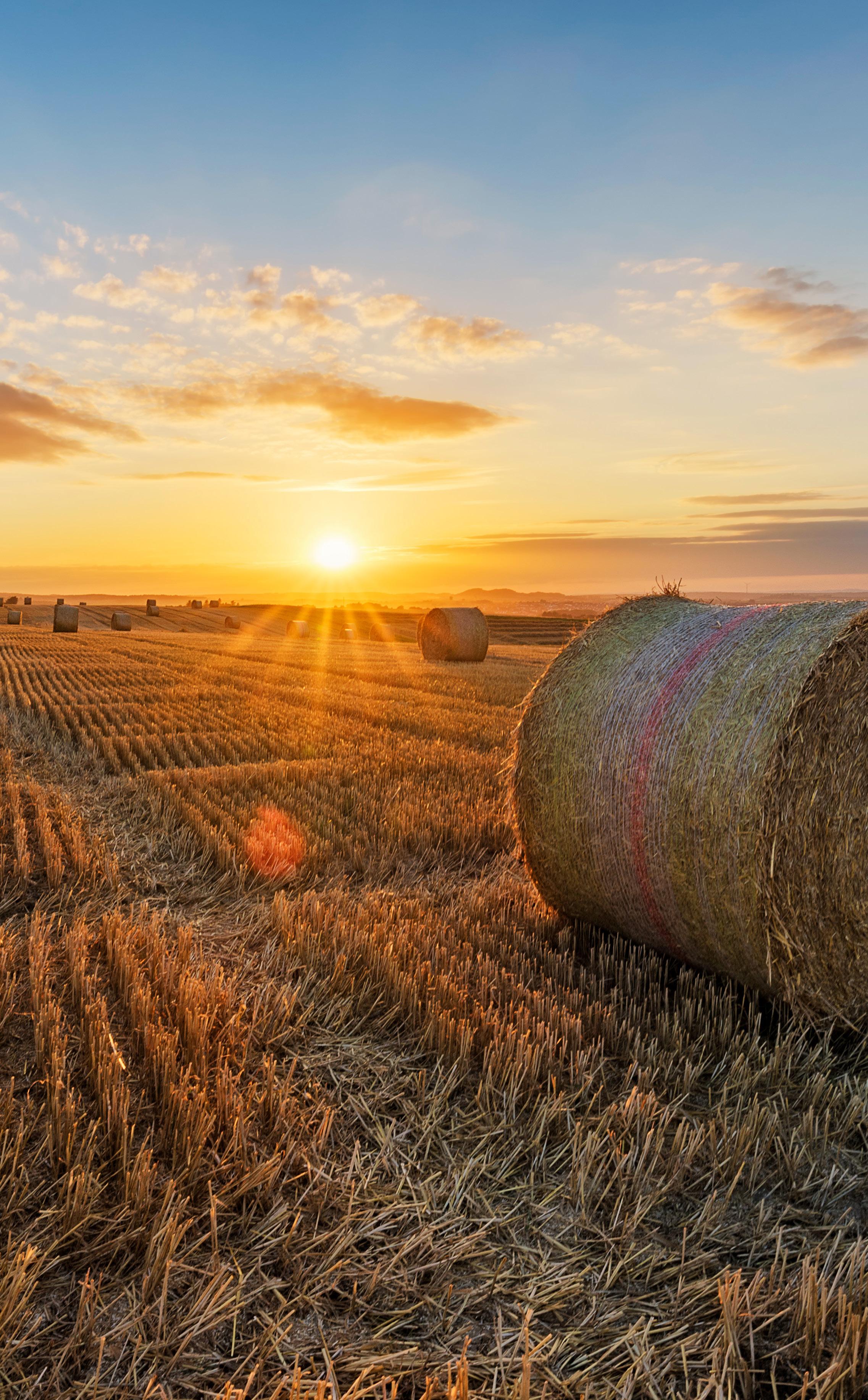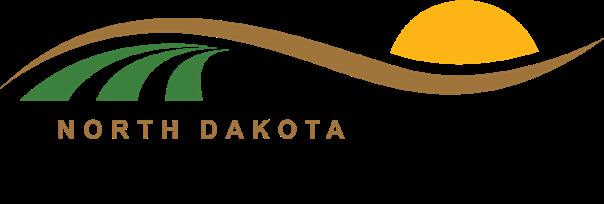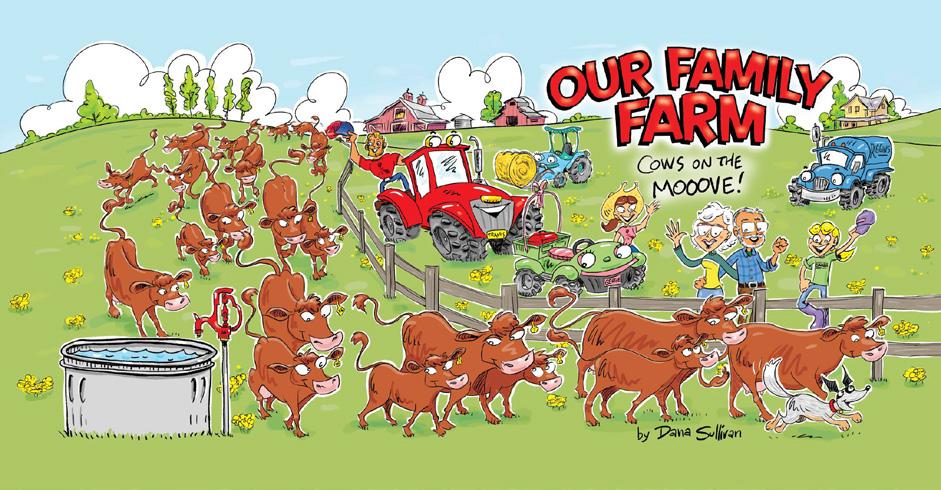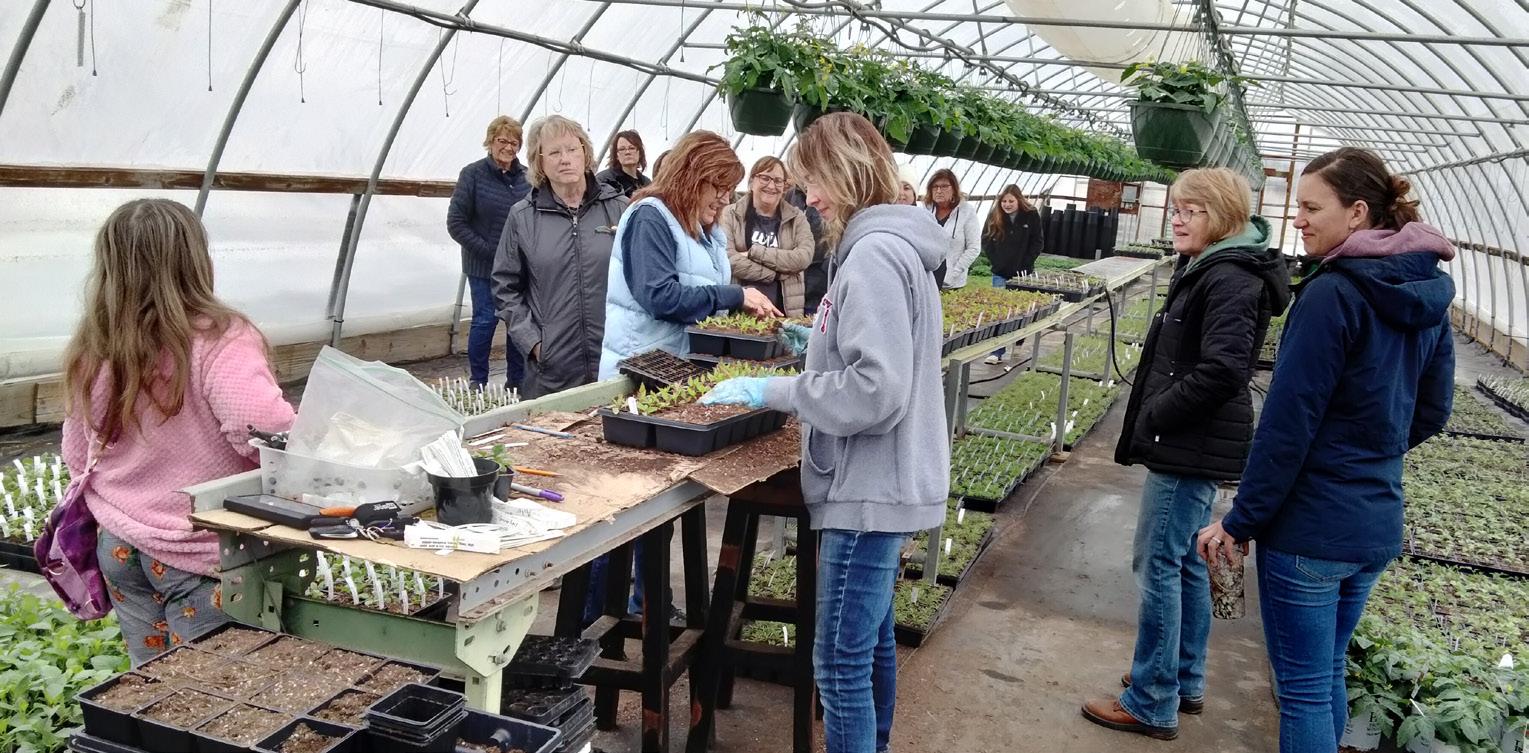NDFU union farmer





I was born and raised in Bowman on a family farm. Once graduating from Bowman High School, I attended college at Dickinson State University. My wife Cheryl and I have four sons and a daughter. Our family has grown over the years, adding three daughters-in-law and four grandchildren. We are beyond blessed that all of our children and grandchildren reside in southwest North Dakota.
I have been an agent with Farmers Union Insurance since December 2001. What I love most about my job is that I get to help people on a daily basis. It does not matter if it is helping them secure insurance for a car loan, home loan or any of their personal/commercial insurance needs. I am happy to help our clients file a claim and to work through that claim if necessary.

Being a Farmers Union Insurance agent also allows me the flexibility to be able to donate my time to the community. I am a member of the Dickinson Eagles Club, the Dickinson Noon Lions Club and a volunteer for

MAKE-A-WISH
Make-A-Wish ND. The Lions and Eagles clubs have been hosting a benefit for Make-A-Wish ND since 2001.

President: Mark Watne


Bob Kuylen
Treasurer: Ronda Throener Bob Finken; Jon Iverson; Shane Sickler; Tyler Stafslien; Michelle Ziesch.
Secretary: Wes Niederman


The 68th Legislative Assembly is closing in on the end of what has been a busy session for NDFU. House Bill No. 1371, which gives animal feeding operations more flexibility under the state’s corporate farming law, has garnered most of the public attention. While NDFU devoted significant time and energy to amending that bill, we have also worked steadily to advance a package of bills that promote livestock and value-added development. Those bills empower local communities to drive their own development strategies and provide new incentives for value-added projects.
At NDFU’s most recent annual convention, delegates passed a special order of business
outlining the organization’s priorities for the 2023 session. That special order called for programs to “promote local acceptance … for North Dakota livestock producers.” With the establishment of a Regional Livestock Planning Grants program and a Livestock Friendly County designation, NDFU has logged two key victories in promoting locally led development. House Bill No. 1437 establishes the Regional Livestock Planning Grants program. The voluntary, opt-in program provides funding to counties and regional development councils to conduct rural development site analyses. The site analyses help counties identify suitable locations for livestock and other value-added development. The program also provides assistance to townships that want to update their zoning ordinances. In short, HB 1437

provides the foundational information and resources counties and townships need to identify economic development opportunities.
Senate Bill No. 2373 builds on HB 1437 with the establishment of a Livestock Friendly County (LFC) designation. The LFC designation provides a framework for the development of a local livestock development strategy. Counties are only eligible after the county commission has adopted a resolution expressing its interest in being named an LFC. The bill also lays out criteria for the designation, including collaboration with all political subdivisions, a submitted development plan, and the completion of a rural development site analysis.
For years, NDFU has recognized the lack of processing capacity as a key barrier to the success of the state’s livestock producers. During the 2021 legislative session, the organization championed the establishment of the Agriculture Diversification and Development (ADD) fund. This session, NDFU supported House Bill No. 1276, which grows the ADD fund and establishes a new Agriculture Infrastructure Grant program.

The ADD fund provides grants and interest buydowns, and is one of North Dakota’s unique tools for developing value-added agriculture in our state. In its first 18 months of operation, the program supported a wide variety of valueadded projects in all corners of the state. ADD
fund recipients included meat processors, ethanol facilities, craft maltsters, pea flour processors and more. The program’s first $10 million appropriation will almost certainly be spent before the end of the biennium. HB 1276 builds on that early success by appropriating $25 million, at least $15 million of which can be used for direct support to projects.
The other $10 million in HB 1276 can be used for the Agriculture Infrastructure Grant program. Agriculture Infrastructure Grants will be awarded to political subdivisions for road and bridge improvements necessary to accommodate new or expanded value-added projects. Grants are also available to help with other “last mile” infrastructure needs, such as natural gas, three-phase power, and water and sewer connections. Addressing those infrastructure needs will benefit new projects and political subdivisions, and boost local support for economic development.
By the time you read this, each of the bills summarized above will be signed into law, but our work is far from over. In the final weeks of session, NDFU is focused on advancing our budget priorities. Chief among those is funding for a new Ag Field Lab Facility at the Agriculture Experiment Station and addressing the backlog of rural road and bridge needs. It will be a busy conclusion to a busy session.
— Matt Perdue, Government Relations Director
(Completed Grades 3-6)
JAMES RIVER
June 12-15
June 27-30
July 5-8
July 17-20
July 24-27
HEART BUTTE
June 19-22
June 26-29
July 5-8
July 18-21
July 25-28
(Invitation Only)
(Completed Grades 7-12)
June 13-17 Heart Butte ( Grades 7-12)
June 20-24 Jamestown ( Grades 7-9)
July 10-14 Jamestown ( Grades 7-12)
July 11-15 Heart Butte ( Grades 7-9)
July 31-Aug 4 Jamestown ( Grades 10-12)
Aug 1-5 Heart Butte ( Grades 10-12)
All-States Leadership Camp : June 25-30 (Montana)
Third Year Award Tour : July 17-20 (Twin Cities)

Campers earn a limited edition T-shirt and Cenex gift card for referring friends to camp as well as award trips for youth program participation. Restrictions apply, visit ndfu.org for details.
Approximately 25-30 individuals are hired and trained each year by NDFU as camp counselors, kitchen staff and facility maintenance workers. Applicants must complete an application, interview and pass the background check process.


Register by May 15 and receive a discount on your registration fee!
By the time mid-April rolled around, warmer temperatures had given farmers renewed hope that a normal spring could still be had. That’s hard to believe, considering an especially hard North Dakota winter.
“Barring any big spring rains, I don’t think it’s gonna be too bad,” said Brad McKay, who grows corn and soybeans near Valley City. “The ground seems to be taking this moisture real good, because we were so dry last fall. But yeah, (snowmelt) is kind of what’s on everybody’s mind.”
As farmers prepare for spring planting, they’re watching snow piles melt with the hope they can get into the field with time to spare. McKay said it’ll be new territory for him.
“I’m 38 (years old), and this is the latest that I’ve seen,” he said. “We’re getting to the point where the snow needs to get out of here. Definitely everybody’s a little nervous. Some of the longer-season corn guys were probably
optimistic that it would be an early spring because last fall was so dry, and they’d be able to get some longer-season corn in. That’s not going to happen.”
Spring wheat acres could also be affected, McKay said, if the weather doesn’t cooperate.


Farmers putting in wheat will be pushing hard to get their acres planted in early May, if they can get in the field.
“You get to that third week in May, and most guys are starting to question whether it’s right to keep planting wheat,” he said. “I would definitely say the late snowpack is going to impact wheat acres (in my area), because it’ll be easier to switch to corn. The guys who often take a couple extra quarters and plant them to wheat — those quarters might be going to corn.”

McKay said May 1 would be an optimistic target to get started this season, but noted May 10 is more realistic. Most importantly, he said, don’t underestimate what farmers can accomplish with a couple of nice weeks in May.
“When the time hits, we’ll work longer days,” he said. “Ten years ago, North Dakota didn’t have the planting power it has today with the amount of high-speed planters that guys have. For us, if we had two straight weeks of good weather and the fields are ready to go, we could probably put our crop in.”
Near Velva, 45-year-old Clint Gjellstad raises

wheat, corn, soybeans, oats, peas and canola. Like McKay, he’s eager to get spring’s work started.

“We’ve got a fair amount of moisture and commodity prices are still hanging in there pretty good, so I’m looking forward to the start of a good year,” he said. “I can’t wait to get in the field.”
Gjellstad is running a similar timeline, hoping to get started by the end of the first week of May, providing his area doesn’t receive any untimely storms.
“With average temperatures and no large rain or snow events, I’d say we’re on track to where that could happen,” he said.
Gjellstad welcomes the moisture after dealing with crop loss from drought two years ago. Last year, his crop received timely rains.
“It goes to show you how much you’re not in control,” he said. “What do you do? You go to church, say your prayers for a good year and then have fun doing it.”


North Dakota pastureland values rose 17.1% from 2022 to 2023 while pastureland rents increased 7.1% during the same time, said Bryon Parman, North Dakota State University (NDSU) Extension agricultural finance specialist.
Data for land rents and values are from the North Dakota County Rents and Prices Annual Survey, found at land.nd.gov/resources, and then put into weighted averages and NDSU Extension regions. The northern Red River Valley, southern Red River Valley and northeastern regions of North Dakota are excluded from the analysis due to low numbers of pastureland sales and rents as well as low livestock numbers.
“Of the more prominent livestock regions in North Dakota, the southeastern region had the costliest pastureland at $1,910 per acre, up 23.3% from a year ago, which was the largest gain,” says Parman. “However, while the southeastern region had the largest increase, all areas were up over 13% as far as pastureland values.”
The smallest increase was the north-central region, up 13.9% from $890 per acre to $1,014 per acre. The other NDSU Extension regions saw increases between 14.9% and 17%.
Rents for pastureland were up as well.
“Pastureland rents are low in terms of dollars per acre compared to cropland values, so a $1 or $2 per acre change in the data can have a significant impact on the percentage changes, such as the northwestern region, which went from $10 per acre to $12 per acre,” explains Parman. “Therefore, the percentage changes in rental rates should be viewed with caution. However, the fact that pasture rents were up across the board and accompany a large increase in pastureland values, it is a justified conclusion that pastureland rents are increasing in North Dakota.”
The costliest rents in the state tend to be in the southeastern region at $34 per acre where stocking rates are a bit more dense, with the least costly being in the northwestern region where stocking rates tend to be lower.
The 17.1% increase in pastureland values is the largest single year increase in more than a decade. This increase is larger than that of 2014 and 2015 when feeder cattle prices hit record highs. Though cattle prices have been
relatively strong over the last year or two, it has come with high feed costs as feed grain commodity prices have remained high.
Despite high production costs to start 2022, net farm incomes remained high helping facilitate a sharp rise in land prices for 2023, Parman said.
The statewide average land price increase from 2022 to 2023 was 13.46%, which is higher than last year’s increase of 10.9%. Rents were also up considerably, rising 6.82% statewide, marking the largest increase in 10 years.
The largest increase in land values occurred in the east central and southern Red River Valley regions with both increasing over 20%. The north central and northeastern regions saw the next largest increase at 15.5% and 14.1%, respectively. The south central and southeastern regions increased between 11.5% and 13.5% for the two regions. Smaller increases occurred in the southwestern region at 9.4% and the northern Red River Valley which increased 6%.
“Overall, the statewide average cropland value moving into 2023 was $2,863 per acre,” said Parman. “The most expensive farmland in North Dakota remains in the southern Red River Valley region at an average of $5,494 per acre while the least costly is in the northwestern region at $1,399 per acre.”
Over the last five years, the southeastern region cropland values have surpassed the northern Red River Valley, with the southeastern region increasing faster. In the most recent survey, the southeastern regional land values were $3,886 per acre while the northern Red River Valley values were $3,605 per acre.
“Cropland rents were up across the board with the largest increase occurring in the east central region at 11.88%,” said Parman. “The south central and southeastern regions were both up between 8.7% and 9.7%. The north central and northern Red River Valley regions were up between 5.6% and 6.8% while the northwestern, northeastern and southern Red River Valley regions were all up slightly less than 5%.”
Article courtesy of NDSU Ag Communications
Deep snow and blizzards are challenging ranchers and their livestock. Inclement weather can cause newborn calves and other livestock to become smothered, trampled and die. These death losses can create an emotional and financial burden for livestock producers.
North Dakota State University Extension specialists encourage ranchers to inquire about the Livestock Indemnity Program provided by the U.S. Department of Agriculture Farm Service Agency (FSA).

“The Livestock Indemnity Program provides benefits to agricultural producers for livestock
deaths in excess of normal mortality caused by adverse weather, disease or by attacks by animals reintroduced into the wild by the federal government,” said Karl Hoppe, NDSU Extension livestock systems specialist at the Carrington Research Extension Center. “Eligible weather events include earthquake, hail, lightning, tornado, hurricane, flood, blizzard, wildfire, extreme heat, extreme cold, straightline winds and eligible winter storms.”
The Livestock Indemnity Program applies to the loss of cattle, poultry, swine, sheep, horses, goats, bison and other eligible livestock.
A fact sheet for the livestock indemnity program is available on the FSA website. Search online for “FSA Livestock Indemnity Program.”
The fact sheet identifies eligible livestock, eligible loss conditions, payment rates, how to file for the Livestock Indemnity Program and loss documentation.

“Ranchers must file a notice of loss with the FSA within 30 days of when the loss is apparent,” said Hoppe. “They also must file an application for payment no later than 60 calendar days after the end of the calendar year in which the eligible loss occurred.”
The Livestock Indemnity Program requires a deduction for normal mortality and these need to be documented, he adds. These normal mortalities do not have to be weather related.
The normal morality rates for cattle in North Dakota are:
Calves weighing less than 400 pounds – 4.6%
Calves weighing 400 to 799 pounds – 1.5%
Calves weighing 800 pounds or more – 1%
Adult cows – 1.6%
Adult bulls – 2%
Hoppe advises ranchers to contact their local FSA office for Livestock Indemnity Program details and requirements as soon as possible so the proper records may be collected. These may include photos with time and date of dead livestock and/or a veterinarian’s death certificate.
Article courtesy NDSU Ag Communications
April Marquart is interested in expanding her knowledge of the family’s ranching business. She farms with her husband and two kids north of Anamoose, where they raise Black Angus beef cattle.
Marquart will get her chance at furthering that education, being named to the 11th class of National Farmers Union’s Beginning Farmer Institute (BFI). She is one of 11 selected from across the country.

“I heard about it through Farmers Union,” she said. “I know there’s more I want to do (for the ranch), but not sure how to do all of it. I heard about this program and that it could really help with our operation.”
Over the course of nine months, attendees will participate in four sessions focused on technical training, mentorship and leadership development.
“I’m hoping to learn a lot of new stuff,” she said. “Anything that can help out.”
Established in 2011, BFI was created to help address concerns about the rapidly aging farm population. According to the most recent Census of Agriculture, farmers older than 65 outnumber those younger than 35 by more than six to one, raising serious questions about who will be operating America’s farms in the coming decades.
“The Beginning Farmer Institute is building the next generation of leaders for Farmers Union and their communities” said NFU President Rob Larew. “It’s no secret that as farmers, we need to set the next generation of farmers up for success. I am immensely proud of our team for putting words into action and building out this program.”
This scarcity of young and beginning farmers is not due to a lack of interest – rather, it is due to immense barriers to entry, including the difficulty of land acquisition, high upfront costs, and a shortage of educational opportunities.

During the program’s hands-on training sessions, participants will gain practical skills to overcome any hurdles they may face, including business planning, accounting, insurance and labor management. The program will employ the Farm and Ranch Business Health Assessment, a tool used to help farmers set goals for strengthening their business.
The other 10 farmers selected to participate in the 2023-2024 Beginning Farmer Institute are Anjelica Lusco (Ky.), British Griffis (Ill.), Hannah Alden (Wis.), Laurel Smith (Colo.), Lexi Linsenman (Mo.), Mallaidh Mleziva (Wis.), Melissa Mahon Stein (Wis.), Romondo Woods II (Mich.), Slade Sizemore (Penn.) and Tammy Copenhaver (Mont.) .
NFU Foundation has continued to grow BFI through the generous support of CHS Foundation, Farm Credit, and Farmers Union Industries Foundation. More information about BFI can be found at nfu.org.
— NFU contributed to this story

Lenard Vetter makes his way through a small herd of Red and Black Angus cattle in a feedlot just west of his ranch
On this April day, the nearly 50-degree weather is welcomed by both Vetter and his herd. Two months ago, it felt a lot different.
“It was like the North Pole here,” Vetter said. “It was cold and miserable, and it never let up. You never had a day where it got above freezing. There was no break.”
The 61-year-old Vetter started calving around Feb. 10 on his ranch, which he and his wife

weather, heavy snowfall hinders ranchers dealing with early calving
run with the families of his son and daughter, northeast of Linton. The Vetter family has 350 head and farms 1,000 acres, growing wheat, corn and soybeans.
This winter was unlike any other, Lenard said, mainly because of the back-to-back months in which a cold February was followed by a stormy March.
“There were nights at 20- and 30-below, and you just basically had to live with the cows,” he said. “If we would have missed a calf that was an hour old, it probably would have been frozen.”
And when it did get warm, the snow hit.
Experiencing one of the harshest winters for snowfall in North Dakota in the past 100 years, ranchers who calved early likely experienced what Vetter called, “A nightmare.”

“There was no break,” he said. “When March started with the storms, it felt like we had three storms a week. It was relentless. It just wouldn’t give up.”
Early mornings didn’t start with checking on the herd, as the family couldn’t even get to its cattle. Even when it didn’t storm, overnight winds had already covered up many of the
CONTINUED ON NEXT PAGE
roads and trails that are typically used.
“Most days, we had to move snow for an hour to get where we wanted to get to,” he said. “We’d open it in the morning, and that was just a path. Then in the afternoon, we’d open it a little wider. Then two or three days later, we’d have to start the process all over again and reopen it all up.
“That’s what we did every day. Feeding cattle and moving snow all day.”
Vetter recalled the 1996-97 winter, widely considered the worst on record for North Dakota, as it holds many of the snowfall accumulation records around the state. Still, Vetter said the calving season itself was not as bad as this year.
“The snow came in January, not February,” he said. “We had a pretty good March, and in April we had one big blizzard. It wasn’t 10 blizzards (like this year). We just had so many this March.”
The Vetters had to purchase hay to keep up with a herd expending energy trying to keep warm. Lenard said they typically have to purchase some hay every year, but had to dig deeper this year because drought hurt hay production last summer.
“Cold is hard on the cows – they have to be fed better,” he said. “This winter probably costed us 30% more feed. When the temperatures are above 30 degrees, you can feed 30% less. But we didn’t have hardly any days above 30.”
A strong wheat harvest led to what was originally believed to be a two-year supply of straw bales. However, Lenard said the winter took its toll on that supply as well.

“We used about three times as much straw as we would in a normal year, mostly because of the storms in March,” he said. “Every pen needed to be re-strawed every day. It was two bales per pen, and we had six different places we had cattle. We thought we had enough, but we’re gonna pretty much use it all up.”
Lenard estimated he lost around 20 calves this winter, though that was partially offset by 14 sets of twins.
“For the weather we went through, that’s pretty dang good,” he said. “If there had been only one person here instead of three of us, we might have lost 50.”
A hard winter on the ranch also means a hard winter living in a rural area, where roads constantly need to be plowed so families can get to school and work. And with the Church of St. Michael nestled conveniently between his ranch and his west feedlot, Lenard and his family made sure all roads were kept open all the way to the highway, a six-mile stretch.
“We didn’t really go anywhere other than to church on Sundays,” he said.
The 2022-23 winter was bad enough, in fact, that Lenard is confident he won’t see another one this harsh.
“You get one of these winters every 100 years,” he said. “I hope I never see another one, and I don’t think I will.”



Melting snow is causing challenges for our North Dakota ranchers. North Dakota State University Extension specialists advise ranchers to move available feed to accessible locations and develop plans to assist livestock at risk of flood exposure.
The Red River Basin is at severe risk of flooding along rivers and overland flooding. Ranchers can take steps to ensure that livestock have safe housing and access to feed resources and clean water. Options may include safety in enclosed structures, higher pasture ground, evacuation to higher elevation, or relocation to local alternatives such as an auction barn or fairgrounds.
“Floodwaters can rise quickly, potentially cutting off access to feed and/or water sources for livestock,” warned Miranda Meehan, NDSU Extension livestock environmental stewardship specialist. “Beef cattle out on pasture are especially susceptible to displacement by flooding. Plans should be made ahead of a potential disaster, with consideration given to pens, loading facilities, transportation, evacuation routes and final destination of livestock.”
“Consider the location of barns used for livestock shelter,” said Zac Carlson, NDSU Extension beef specialist. “If a barn is located
in a flood plain, like most old barns built close to water, then provide an escape route for the cattle to leave if an overnight flood occurs. Do not shut the barn door unless you check livestock every few hours.”
Floodwaters often prevent ranchers from reaching feed supplies, either directly or through damage to roads. Ranchers should ensure accessible storage facilities and an adequate supply of feedstuffs.

“Ranchers understand at-risk locations, and having a plan for high ground for both feedstuffs and animals is important,” said Travis Hoffman, NDSU Extension and University of Minnesota Extension sheep specialist. “Provide forage as possible, but plan for grain supplementation at or near the barn for calving, lambing or kidding to support energy needs during lactation.”
“Having feed supplies on hand is important because feed assistance may not be available during a flood,” said Karl Hoppe, NDSU Extension livestock systems specialist at the Carrington Research Extension Center. “Ranchers should pre-select sites on high ground for hay, emergency water supplies, and fencing supplies or panels.”
Wet feeds can be a safety or fire hazard, and moldy feeds can harm animals. While options
may be limited, work with your NDSU Extension county agent or a nutritionist on risks and best practices.
“Don’t feed moldy or spoiled feed, as molds in feeds can cause abortions or may be toxic,” said Dr. Gerald Stokka, NDSU Extension veterinarian and livestock stewardship specialist. “Contact your veterinarian, nutritionist, Extension agent or the NDSU Veterinary Diagnostic Laboratory for postflood analysis of feed safety and quality. Diseases caused by spore-forming bacteria such as anthrax may be increased from the exposure of overland or river flooding. Consult your veterinarian post-flood if animal health concerns arise.”
Post-flood management should include a physical evaluation of animals for water-related injuries. Flood waters with current can cause stress and muscle weakness, and debris could cause bodily injury.
While not all areas will experience flooding, mud will likely be an issue on many farms and ranches this spring. There are few options once muddy conditions are in place, so preventive

practices are key.
These recommendations can aid in reducing muddy conditions:
Scrape lots to maintain a 3% to 5% slope away from the feed bunk.
Reshape mounds to ensure quick drainage.
Move livestock to temporary feeding areas such as stockpiled pastures with adequate drainage or fields containing crop residue such as corn stalks.
“Ranches should evaluate their potential for flooding and plan accordingly,” says Meehan. “If you do not have access to higher ground, you may need to consider moving livestock off-site until the risk of flooding subsides. If you need help evaluating options, contact your NDSU Extension agent or emergency management office.”
Visit NDSU Extension’s flood website at www.ndsu.edu/agriculture/ag-hub/ag-topics/ disasters/flood for more information and resources to aid in flood preparations on your operation.
Article courtesy of NDSU Ag Communications
North Dakota Farmers Union has been a strong advocate for cooperatives throughout the life of our organization. From the very beginning of the cooperative movement in our state, we have played a major role in establishing and developing cooperative businesses.
The growth of Farmers Union cooperatives and the Farmers Union organization has occurred through common efforts that have proven to be mutually beneficial. We should take concerted action to prevent disassociation between Farmers Union and cooperatives, and instead work to maintain our common identity. Members should elect delegates and directors who pledge to maintain the relationship between these two farmer institutions.
In these times, when we face extreme market exploitation by monopolistic practices in industries surrounding agriculture production and processing, the promotion and development of farm cooperatives is an effective tool for increasing farmers’ bargaining power.
Many cooperatives today have concerns about member-owner loyalty. Interestingly in North Dakota, cooperatives continue to be successful and members generally have a better understanding of the cooperative business model. We believe this is due, in part, to the work of our organization in carrying out one of the primary principles of a cooperative – to provide cooperative education and training for members, elected representatives, managers and employees, along with ongoing information to the public about the benefits of cooperation.
NDFU provides a long list of programs that focus on cooperative success, starting with our early youth education and camping program. More than 2,000 youths attend classes and camps annually, where we form cooperatives – electing directors, hiring managers and distributing earnings – to teach the fundamentals of the cooperative business model.
In our adult education programs, we partner with cooperatives to provide strategic planning; director, manager and employee
training; patron focus group meetings; audit presentations; educational bus trips to state and regional cooperative facilities; and consumer education.

NDFU has also played a leadership role in the development of the Quentin Burdick Center for Cooperatives through funding and participation on the advisory board. We have participated in the development of coop classes and curriculum development for public schools, including research studies on cooperative opportunities and challenges.
Patronizing and supporting cooperative enterprises that retain equity, control, benefits and ownership for agricultural producers within rural communities is a proven self-help, homegrown rural development mechanism that builds needed economic infrastructure.

While education is one of the key principles, we cannot ignore the others. Fundamentally, a cooperative is a jointly owned enterprise engaging in the production or distribution and marketing of goods or supply of services, operated by its members for their mutual benefit. When we forget our purpose, we lose the support of patrons. Cooperatives were never designed to be like other businesses. They are a self-help tool. We cannot lose sight of the original objective.
I challenge our members who are patrons of cooperatives to take time to participate in your cooperative. I challenge our cooperatives to remember their roots and purpose. This, along with continued education, is what will drive continued cooperative success in North Dakota.


The North Dakota Rural Electric Cooperative Foundation is expanding its efforts to improve rural food access. This spring, the foundation will lead a feasibility study to explore the benefits of a nonprofit warehousing system, which would serve a 75-mile radius around Minot. The project emerges as the number of rural grocery stores in the state continues to decline, amid the mounting hurdle to compete with big-box stores and large franchises.
North Dakota Farmers Union is part of the steering committee that will lead this effort.

“North Dakota is really lacking in warehouse capacity, especially in rural areas. Warehouses tend to be one of the most ignored elements of infrastructure and logistics, but they are fundamentally important,” said Lori Capouch, rural development director, North Dakota Association of Rural Electric Cooperatives. “Our overall goal is to help rural businesses improve sales volume, attain lower wholesale prices and gain greater access to suppliers. A successful warehousing system could enhance access to quality products and improve variety for people living in rural areas, and create a distribution channel for locally produced foods.”
Information gleaned from the study will be used to engage partners in the future development of a warehousing system. Anticipated partners include grocery stores, local food producers, food banks and other
entities that purchase wholesale food. Crossroads Community Advisors will conduct the study. From April 1 to Oct. 1, representatives will be contacting entities that purchase wholesale foods or produce local foods to gather information for the study. Information will be presented collectively, and individual data will remain confidential. Entities that purchase wholesale foods and local food producers who wish to participate in the study can contact Neil Doty, Crossroads Community Advisors, 701-238-6169.
— NDAREC
the Fourth children’s book from North Dakota Farmers Union
$16.95 plus tax
Dusty learns about generations of family and equipment on their farm, and the latest in soil technology. Find out how Dusty makes Gramps a new thingamajig for his tractor to save the day!






ADAMS
Rhonda Knutson, Arlene Walch

BARNES
Tyler Van Bruggen
BENSON
Megan Olson, Kelsey Smith
BOTTINEAU
Brandy Brown
BOWMAN/SLOPE
Mary Fischer, Joy Kinsey
BURKE
Denise Miller
BURLEIGH
Michaela Froseth, Mary Ludwig
CASS & TRAILL
Kourtney Bitz
CAVALIER
Carissa Iverson
DICKEY
Pam Henningsen
DIVIDE
Jessalyn Thomas
DUNN
DeEtta Richau
EMMONS
Acacia & Aaron Stuckle
GRAND FORKS
Jill Johnson
GRANT
Amanda Petrick
HETTINGER
Nancy Nadvornik
KIDDER
Stacie Fettig
LAMOURE
Carly Rott, Connie Bitz, Karen Sandness, Mary Schlosser
LOGAN
Bailey Becker
MCHENRY
April Marquart
MCKENZIE
Steph Scofield
MCLEAN
Roxann Bloom
MERCER
Madelyn Jennings
MORTON
Savanna Horst
MOUNTRAIL
Jodi Obert
NELSON
Sheila Rude
OLIVER
Becky Berg
PIERCE
Becky Tofte
RAMSEY
Andrea Johnson
RANSOM
Tyann Henderson
RENVILLE

Thurstan Johnson
RICHLAND
Heather Woods
ROLETTE
Jackie Heinz
SARGENT
Sara Dux
SHERIDAN
Jess Boehm, Sarah Crimmins
SIOUX

Mary Jean Hunter
STARK
Sarah Kuylen
STEELE
Megan Vig
STUTSMAN
Ashley Vinje, Danielle Walleen
TOWNER
Karly Held
TRAILL
Kourtney Bitz
WALSH
Kathy Houser
WARD
Karley Porter
WELLS
Michelle Kukowski, Patricia Patrie
WILLIAMS
Alvina Skogen, Bernadette Perdue
The commitment of leaders to the development of our young people is of primary importance to the growth and success of rural America and Farmers Union. NDFU recognizes our youth leaders for their energy and exceptional service.
Over the past month, USDA made a string of announcements advancing the Biden-Harris Administration’s action plan for a Fairer, More Competitive, and More Resilient Meat and Poultry Supply Chain, as well as the efforts at USDA to boost competition and expand domestic production in the fertilizer industry.

Under a proposed rule issued by USDA on March 6, the voluntary “Product of USA” label will now require all steps in the production chain occur in the U.S. in order for a meat or egg product to bear the label. Secretary Tom Vilsack announced this rule while speaking at NFU’s national convention in San Francisco.
The current rules for the label allow meat from animals that spent some of their lifespan outside of the U.S. to be labeled as “Product of USA,” which runs counter to consumer expectations from such a label. While this new rule is a not a replacement for mandatory country-of-origin labeling, it is a major step in the right direction.
USDA also announced nearly $200 million in investments to increase independent meat and poultry processing capacity. The investments were announced as part of the Meat and Poultry Processing Expansion Program (MPPEP) and the Meat and Poultry Intermediary Lending Program (MPILP). The programs are aimed at helping processors increase capacity and finance independent processing startups.
As part of USDA’s Fertilizer Production Expansion Program (FPEP), USDA announced a $29 million investment to help increase production of American-made fertilizer, as part of the Biden-Harris Administration’s efforts to spur competition, provide U.S. farmers with more choices and fairer prices, and reduce dependence on foreign fertilizer sources, such as Russia and Belarus.
In May 2022, amidst robust demand, President Biden directed USDA to increase the program from $250 million to $500 million. USDA received nearly $3 billion in applications for crop years 2023 and 2024. As fertilizer prices have skyrocketed due to a lack of competition in the industry and Russia’s
invasion of Ukraine, the FPEP program will be critical to ensuring the long-term availability of American-made fertilizer for farmers.
Throughout March, there have been several developments in Congress and from the Biden Administration that will have major implications for the production of biofuels in the years ahead.
On March 1, EPA approved petitions from eight states to allow for year-round sales of E15, starting in 2024. The proposal covers petitions from Illinois, Iowa, Minnesota, Missouri, Nebraska, Ohio, South Dakota and Wisconsin. NFU has urged the Biden Administration to allow E15 usage for the upcoming summer driving season, as was done last year.
Over on Capitol Hill, two key pieces of legislation have been reintroduced in the 118th Congress. On March 14, Sens. Deb Fischer (R-NE) and Amy Klobuchar (D-MN) introduced the Consumer and Fuel Retailer Choice Act of 2023. This legislation will enable the yearround, nationwide sale of E15 and permanently extend the Reid vapor pressure (RVP) volatility waiver to ethanol blends above 10 percent, providing nationwide uniformity across U.S. fuel markets.
On March 22, Sens. Chuck Grassley (R-IA) and Amy Klobuchar (D-MN) announced the reintroduction of the Next Generation Fuels Act, with Rep. Miller-Meeks sponsoring the House companion. This legislation establishes a minimum research octane number (RON) standard of 98 for gasoline, requires the added octane value to reduce carbon emissions by at least 40 percent compared to regular gasoline, and incentivizes vehicle technologies that reduce greenhouse gas emissions and increase fuel economy.
NFU will pursue the passage of both bills this Congress. NFU supports efforts to expand the production and sale of E15, while noting use of higher-level blends of ethanol, like E30, would add additional benefits to the economy, the environment and America’s farmers.
On Easter Monday, Founding Farmers Co. Catering & Events had the honor to provide our delicious, scratch-made donuts and breakfast food to the hard-working volunteers who helped set up and put on the annual White House Easter Egg Roll.

A tradition dating back to 1878, this year’s theme was titled “EGGucation.”
The South Lawn and Ellipse were transformed into a school community full of fun educational activities for children of all ages to enjoy.
Behind all the set up of these activities and the smooth running of the event itself are the volunteers. Founding Farmers Co. Catering & Events rolled out the red carpet for them with bunny and Easter egg donuts and hearty breakfast tacos – all made from scratch with ingredients sourced from American family farmers, including members of North Dakota Farmers Union.
The catering team went above and beyond for this historic event, and they hope to be invited back next year to keep the scratch-made food and smiles going all Easter Egg Roll-long.
Founding Farmers Co. Catering & Events is one of the businesses run by NDFU’s restaurants in Washington, D.C.

Ads must be submitted through the online form at www.ndfu.org. Click “Classifieds” at the very bottom of ndfu.org and fill out the online form. Ads must be re-submitted each month. No exceptions! Deadline is the 15th of every month. Limit 75 words.
MEMBERSHIP DUES MUST BE CURRENT!
MELROE CENTER CART, 10 ft wide with harrow sections, hyd cyclinder included, great for dragging yards, $300; Extra drag sections $25 each. 701-341-0331, Dale Mason, Fessenden.
1976 WHITE 2-70 row crop diesel tractor w/ 6000 Hrs. Factory 3-point, 18.4 x 38’s (65 %), wide front, Over/Under Trans, inj. pump done 2018, front weights, ROPS. Engine starts & runs great, quiet trans. Comes with new seat kit & battery. Asking $8900. I am thinning my collection. 701-720-1263, Jim Norlin, Des Lacs.
JD 1620 COULTER (chisel plow converted to vertical tillage tool), 40’, new hoses, new lift cylinder, good tires and lots of new bearings, Blades measure 17”. $15,000 OBO. 701-3215711, John Kempf, Ashley.
CULTIVATOR, 8 row Danish tine cultivator, 3 pt. hitch, depth wheels, stand, adjustable row widths, sway discs. $250 OBO. 701-952-8973, Glen Nagel, Jamestown.
2188 CIH Combine, 4800 engine hours, stored inside, $22,000; 1586 Tractor, about 9,000 hours, original owner, stored inside, $21,000; 2014 Chev. Traverse, 118,000 miles, stored inside, $12,000 OBO. 701-516-2920, Aaron Subart, Robinson.
D-6 CATERPILLAR with Dozer $3,000; Tox-OWik grain dryer $500; ‘76 Mercedes Benz to be restored 300 diesel $2,500. 701-8453594/701-373-5480, Donald Jorissen, Valley City.
CONCORD AIR SEEDER 20 ft with dutch openers to place seed and dry fertilizer in 6” rows and deep band nh3 between rows, 80/40 cart with fill auger rebuilt, both seed and fertilizer meters, also winch to hook up nh3 tanks. $6000 obo; 28 ft 7200 hoe drills for parts or whole drill; Two 8 ft Melroe drills w/ seeder weeder and fertilizer $1200 obo; 851 and 852 NH balers with auto wrap. 701-269-6216, Jerry Miller, Streeter.
JOHN DEERE 1770NT PLANTER, 1600 CCS
Variable Rate max emerge plus, section control, electric shut off hyd drive, liquid in-furrow, ground drive liquid pump flow monitors, rear caddy hitch, pneumatic down pressure, Screw Yetter trash whippers, precision eset disks, copperhead closing wheels 3” mud smith wheel. 1100 acers on new Parallel Arms and disks; John Deere 8630, 20.8 38 tires 50 series motor, Deere 8640 20.8 38 Michelin tires, 50 series motor. 801-320-1580, David Mutschler, Wimbledon.
15-30 MCCORMICK TRACTOR, 1 new tire LT245-75R-Load Range E. 2- Cream Separators, 4-wheel Steel Running Gear, 1 Covered Wagon Running Gear, 12’ Kirschman Drill, 1 Horse Potato Cultivator, 4 Btm. Pony & Packer, Saddle and 2 bridles. Email: larryn@westriv.com. 701548-8020, Larry Nagel, Shields.
IH 3414 industrial loader tractor, shuttle clutch, good tires $3900; Arts way 300 grinder mixer drag auger, good shape $2200; Case IH 12 ft. 6200 press drill reconditioned $2800; Used parts for IH press drills and many other IH drills 7, 8, 10, 12 and 14 ft. or combinations; IH 14 ft. disk good shape $1400; New Holland 456 9 ft. mower reconditioned $3500 701-400-5742, Gerald Miller, Mandan.
TWO STEEL BINS on cones w/ aeration fans; Bourgault knock on cultivator sweeps; used Case IH 8230 feeder chain; combine pickup guards/lifters; 3 triangular grain auger hoppers w/straps/chains to fasten onto grain auger; old front tine rototiller; Simer water pump; farm scale/steel wheels; used 16” JD cultivator shovels/spikes; 4x8’ wooden stone boat; John Blue anhydrous nitrolator w/hyd shut off hoses. 701-629-9003, Doug Halden, Stanley.
OLDER BOBCATS, 500 600 610 parts or machines. 701-641-2346, Rod Anderson, Ray.
TRACTORS, IH 706s on up; JD’s 4520, 4620, 5010, 5020, 6030, others; MM 950’s on up; Oliver 1963 on up; ACs 200, 220, 210, D-21, others. Buy all running or not. 701-628-2130, Jerry Lumley, Stanley.
8450 HESTON or newer swather with hay head, low hours, in good condition. Do not need grain head. Might also consider a similar IHC or New Holland machine. Call evenings. Leave message. 701-948-2290, Kenneth Richau, Zap.
1930 MODEL A, four-door. Runs and drives, electronic ignition, original and 95% complete, restore or drive it, missing 2 of the door glasses and a few small things, serious inquiries only. $6500 firm. If interested, please call/text evenings or weekends. Pics available. 701-2160094, Doug Perdue, Ray.
PATIO TABLE & CHAIRS, Table is 31 1/82” dia. Comes with two chairs; Honeywell HEPA air purifier; Honeywell Ultrasonic cool mist humidifier. Mover from 1600 sq foot home to an apartment. No room. 701-251-4424, Donald Guthmiller, Jamestown.
BLUE/RED HEELER PUPS with a 1/4 Catahoula. 5 weeks old. They are already playful, feisty, and weened. Ready to go to good homes. Parents have great disposition. Asking $100. Please call or text. 701-220-7778, Melissa Pfennig, McClusky.
ANVILS, 100 or 120 pounder, nice post vice; 7 up slider pop cooler; Pennzoil cast iron base; Coke cast iron base; Coffee grinder floor model. 701-220-5746, Val Ganje, Bismarck.
HP CAMPBELL HAUSFIELD electric wire welder, new in unopened box. Marguette 220 arc farm welder, helmet, cables, and rods. Propane weed wand, tank. Buddy Flex - Mr. Heater fish house propane heater, 8,000 - 11,000 BTU, new in unopened box. Craftsman bench vise mounted on plank. Belt driven bench grinder mounted on plank, Most items new/excellent. Must see, make reasonable offers. 701-838-5014, Don Eliason, Minot.
MINIATURE SAA COLT 45, 71/2 barrel with box and walnut display case. #36 of 1500. Everything functions just like a full sized SAA. Absolutely like new, $800; 3 scopes Bushnell 4x for .22 $30; Nikon Buckmaster Stainless 3x940mm $200; Leupold 3x9 40mm Matte, w/ leupold rings $325. Can send photos. Minimal shipping charges; Mossberg SSi-One single shot .223 rifle with scope. Call for details. 701580-3357, Martin Hanson, Zahl.
1989 WINNEBAGO WARRIOR on Toyota chassis, 6 cyl. EFI engine, auto, power steering, cruise, dually, AC, air cushion ride, shedded, dining table, couch, make into 3 beds, stove, fridge, freezer, bath, AC, TV, updated upholstery, water reservoir, 15-30 amp plug ins. low mileage. 701-952-8973, Glen Nagel, Jamestown.
CAR DOLLY, KarKaddy 4800 or more lb capacity, disk brakes preferred. 701-228-2190, Darrel Stokes, Bottineau.
1989 19’ ALUMACRAFT BOAT with cover, 9.9 HP Suzuki motor, and Shore Liner boat trailer with rollers. Stored inside. Please leave message. 701-925-5821, James Kimball, Noonan.
ENTERTAINMENT CENTER, size 59 inches deep X 39 inches high with glass doors has slide out shelf and one-half 27 inches high with doors. solid oak can send picture. Call late evenings. 701-482-7749, Robert Huff, Donnybrook.
OLD STUFF: Old out of service ND road signs, Indian Head, Highway patrol door sign. ND license plates, ND picked arrowheads, ND small town metal trade tokens. Advertising signs, gas pumps from old gas stations. Signs from implement dealerships. Advertising items that were give away xmas items from small town stores like crock jugs, calendar, thermometer, custard glass or anything else old and interesting. 701-220-5746, Val Ganje, Bismarck.
PRAIRIE DOG HUNTERS to hunt on my land. Make reservations now. Email: larryn@westriv. com. 701-548-8020, Larry Nagel, Shields.
REGISTERED YEARLING ANGUS BULLS, free delivery in North Dakota, will keep until July 1. 701-228-3834, Bruce Knudson, Bottineau.
2022 HAY BALES, 5X6 Alfalfa & Brome Grass Mix $55; Great Alfalfa Bales $65; Some Wheat and Oats Straw, Slough bales, very reasonable. 701400-2683. Doug Neuharth, Hurdsfield.
70 BALES, upland grass hay, 5X6 ft, net wrapped with 569 JD Baler. 701-720-1483, Randy Hochstetler, Rolette.


Burleigh County Farmers Union hosted a ladies ag event at the Baldwin Greenhouse and Nursery. They enjoyed a light lunch, planted a small flower or succulent to take home and had a chance to tour the six greenhouses on site.



